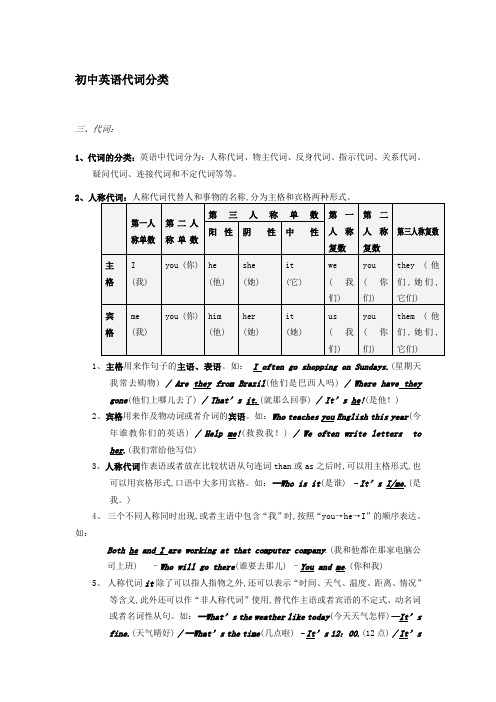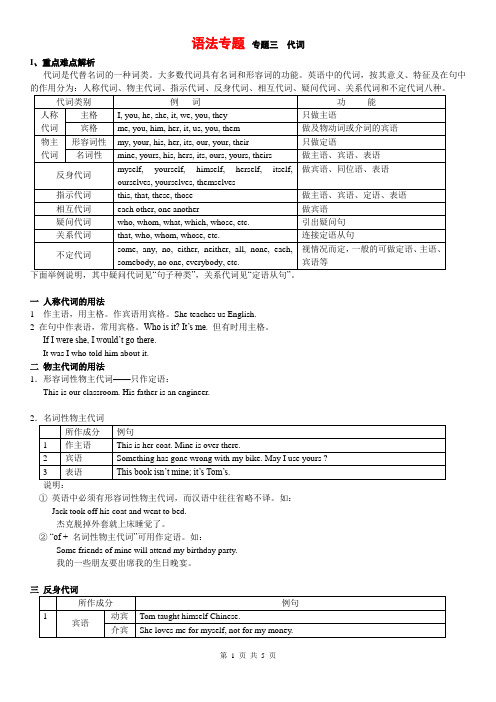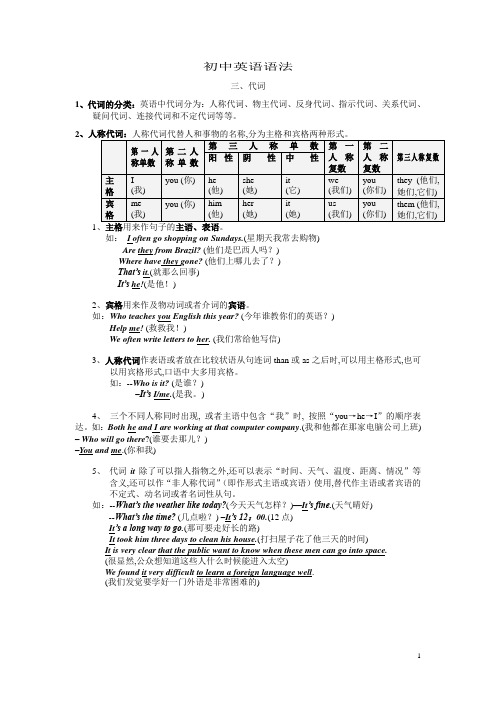代词(三)
英语中的代词

英语中的代词英语中的代词英语作为一种广泛使用的语言,其中一个重要的语法范畴是代词。
代词在英语中起着重要的作用,它们在句子中代表了已经提到的人、物或事情。
这些代词通常用于简化句子结构,并使文本更加流畅。
在英语中,代词通常用于替代已经提到的事物,以避免重复。
它们可以替代名词、名词短语,甚至整个句子。
通过使用代词,我们可以更有效地传达我们的意思,同时使我们的文本不显得冗长。
英语中的代词有很多种,以下是一些主要的代词类型:1、人称代词:这是用来代替人的代词。
例如,我(I)、你(you)、他(he)、她(she)、它(it)、我们(we)、他们(they)。
2、指示代词:这些代词用于表示特定的对象。
例如,这个(this)、那个(that)、这些(these)、那些(those)。
3、疑问代词:这些代词用于提问中,用于询问人、物或事情。
例如,谁(who)、什么(what)、哪里(where)、何时(when)、怎样(how)。
4、关系代词:这些代词用于引导从句,并表示从句与主句之间的关系。
例如,谁(who)、什么(what)、哪里(where)、何时(when)、怎样(how)。
5、不定代词:这些代词用于表示不确定的或未知的人、物或事情。
例如,一个(a)、一些(some)、任何(any)、每个人(everyone)。
正确地使用代词可以帮助我们创建清晰、易于理解的文本。
也需要注意不要误用或错用代词,以免引起混淆或误解。
总的来说,英语中的代词是一个重要的语言工具,可以帮助我们更好地表达自己的意思。
小学英语语法代词小学英语语法代词:介绍、用法和注意事项在英语学习过程中,代词起着非常重要的作用。
尤其是对于小学生,掌握代词的用法能够更好地理解和运用英语。
本文将为大家介绍小学英语语法中的代词,包括其特点、用法和注意事项,以帮助孩子们更准确地使用英语。
一、代词的种类和特点在小学英语语法中,常见的代词有:人称代词、物主代词、反身代词、指示代词和不定代词等。
代词的用法和分类

代词的用法和分类代词是指用来代替名词的词语,它可以在句子中起名词的作用。
代词的使用可以简化句子结构,避免重复使用同一词语,使句子更加简洁明了。
根据其在句子中的作用和用法,代词可以分为人称代词、指示代词、疑问代词、不定代词、反身代词和相互代词等几个主要类别。
一、人称代词:人称代词用来代替特定的人或事物,分为第一人称、第二人称和第三人称。
它们的用法如下:1. 第一人称:代表说话人自己,如I(我)、we(我们);2. 第二人称:代表与说话人交流的对象,如you(你);3. 第三人称:代表与说话人和听话人没有直接关系的人或事物,如he(他)、she(她)、it(它)、they(他们/她们/它们)。
二、指示代词:指示代词用来指示特定的人或事物,分为指向近处的“this”(这/这个)和指向远处的“that”(那/那个)。
例如:“This is my book.”(这是我的书)和“That is your pen.”(那是你的笔)。
三、疑问代词:疑问代词用于提问特定的人或事物,包括who(谁)、what(什么)、which(哪一个)等。
它们常用于疑问句或间接疑问句中。
例如:“Who is that girl?”(那个女孩是谁?)和“I wonder what she is doing.”(我想知道她在做什么。
)四、不定代词:不定代词用来指代不确定的人或事物,包括somebody(某人)、something(某事)、anybody(任何人)、anything(任何事)等。
不定代词常用于肯定句或否定句中。
例如:“Somebody called for you.”(有人找你)和“I didn't see anything unusual.”(我没有看到任何不寻常的事情)。
五、反身代词:反身代词用来指示动作的执行者与承受者是同一人,包括myself(我自己)、yourself(你自己)、himself(他自己)等。
3(三)代词

1.用下列各句括号内人称代词的适当形式填空:1.Could you tell me whose car it is.Is it _____ (he) or _______(she)?2.This letter is for George and__________ (I).3.--Is that Mary over there?--Yes,that’s __________ (she).4.0n the weekends Bob and____ (I)usually clean ___(we) cars in the garden.5.I teach _____(he)Chinese,and he teaches ______(I)English.6.Mr and Mrs Brown were talking about __________ (they)new house and__________ (they)new neighbours.7.--Who’s there?--It’ __________ (I).8._____(he)father is a worker.____(I)is a teacher,and ____ (she)is a doctor.9.__________ (she)has finished__________ (she)exereises.Have__________ (you)finished__________ (you)?10.Betty cleaned__________ (she)own room and__________ (we),too.11.__________ (they)father didn’t let__________ (they)go to the movie.12.I gave__________ (he)some flowers of__________ (I),and he gave__________ (I)some of__________ (he).13.Today we went in__________ (we)car.Tomorrow we are going in__________ (they).14.I’ll be glad to lend __________ (I)books to__________ (I)friends and to__________(you).15.He took the fish from__________ (he)cat and gave it to__________ (she). Ⅱ.以适当的自身代词填空:1.At the age of eight,the boy started teaching ___________ (he) mathematics.2.She said to ___________ (she),“What a hard problem!”3.The children all thought that they could look after ___________ (they).4.I don’t like the present ___________ (it),but the box.5.She is living all by ___________ (she)now.Sometimes she stays with her son for one or two weeks.6.They enjoyed ___________ (they)very much at the party.7.The visitors helped ___________ (they)to the cakes.8.It was noisy in the room.I could hardly hear ___________ (I)speak.9.If you are careless,you will hurt ___________ (you).10.I wonder whether Peter made the model ship ___________ (he).11.She looked at ___________ (she)in the mirror.12.George is very pleased with ___________ (he).13.He was happy as he had cooked ___________ (he)a good meal.14.If you can do it ___________ (you),never leave it to others.15.Oh,Mum,I don't want you to wash me.I can wash ___________(I)now.16.Mr and Mrs Wilson made the cake ___________ (they).17.Make ___________ (you)at home.18.The lady bought ___________ (she)a new hat.19.He thinks only of other people,never of ___________ (he).20.The painting was drawn by the children ___________ (they).Ⅲ.在下列各组句子中,选择适当的词填入空格:1.some,any(1)I'll grow ___________ red roses in my garden.(2)--Have you ___________ matches?--No.Ask Paul if he has ___________ .(3)If you have no money,I’11 lend you ___________.(4) ___________ of us like cats,like dogs.(5)Are there ___________ cows in the fields?(6)Not all your answers are correct.___________ are,___________ are not.(7)Is there ___________ ink in the bottle?(8)--Will you have___________ milk in your coffee?—Yes,a little please.(9)I wanted___________ of those apples,but the shop—owner said that hehadn’t___________ .(10)There is no orange juice in the fridge.I must go and buy___________ .2.something,anything,nothing,everything(1)There is___________ I want to ask you.(2)What are you looking for?Have you lost___________ ?(3)—Are you doing___________ tonight?--No,___________ .(4)He said that he would do___________ for his people.(5)He was sad because___________ in the house was burnt down in the fire.(6)I don’t want___________ to eat.I'm not hungry.(7)--Do you want___________ else,sir?--No,___________ else.(8) ___________ is ready for the New Year's party.3.someone/somebody,anyone/anybody(1)There isn’t___________ in the room.(2)--You are waiting for___________ ,aren’t you?—No,I'm not waiting for___________ .(3)Can___________ answer this question?(4)There’s a man at the door.Maybe he is looking for___________ .(5)Will you ask___________ to carry this bag for you?(6)I could hardly find___________ I knew in the lecture hall.(7)Does___________ want to have a try?(8)Look,the light is on in the kitchen.There must be___________ there.4.no one/nobody,no,none(1)--Who’s in the dining room?—________________.(2) ___________ of us is always right.We all make mistakes.(3) ___________ wants to go there.(4)John has several cars,but I have___________.(5)I have___________ friends in this city.(6)___________ of the books is easy for us.(7) ___________ student can find the way there.(8)The girl showed me several bags,but I bought ___________ of them.5.anyone,any one,everyone,every one(1)I didn't telephone___________ yesterday.(2)Does ___________ of you want to go to the cinema with me?(3)Have you ever been to___________ of these cites?(4)She didn’t let___________ enter the museum until l0:00.(5)___________ of the eggs is fresh.(6) ___________ can get a free ticket for Sunday’s basketball match.(7)He ran to the village and told the news to ___________.(8) ___________ of the pupils wore a white shirt.6.what,which,who,whom,whose(1) ___________ would you like to do after school?(2) ___________ sports shoes are these ,yours or his?(3)--___________ is he?—A policeman.(4)--___________ is the girl?--Tim’s little sister.(5) ___________ language do you prefer to 1earn,English or Japanese?(6)--___________ called this morning?--Your teacher of English.(7)___________ is he talking to now?(8) ___________ is your mother,the tall woman or the woman in blue? 7.(a)few,(a)1ittle(1)He has___________ friends here.So he hardly goes out on Sundays.(2)He has___________ friends here.So they often have a get—together.(3)I'm going to have a trip to Europe.You see,I have___________ days of holiday.(4)I'll have___________ holidays this year as I'll be very busy.(5)You can buy something else.I still have___________ money.(6)He had___________ money left after shopping all afternoon.(7)Mother was happy when she saw her son making___________ progress.(8)Though I worked hard,I made ___________ progress in my studies.8.many,much(1) ___________has been done to make our city more beautiful.(2)Has he got___________ books on computer science?(3) ___________ of the students went camping in the summer holidays.(4) ___________ people died in the train accident last week.(5)There isn’t___________ air in the bottle.The mouse is dying.(6)Can a computer store___________ information?(7)To my surprise,Adams had___________ interesting stamps.(8)There wasn’t___________ interesting news in the news programme.Ⅳ.选择填空:1.—— Which one would you like to take,this one or that one?——I would like to take __________.A.two B.both C.all D.two of them2.These two pianos are very good.You can choose__________ of them.A.both B.each C.either D.any 3.Either Bill or Black said that he himself was fight,and__________of them would give in.A.none B.both C.no D.neither4.I looked through several books,and I liked__________ of them.A.neither B.no C.none D.nothing5.On__________ side of the street we could see shops and restaurants.A.either B.every C.both D.all 6.Please come at__________ time.I'll show you__________ my stamps.A.any,all B.all,any C.some,some D.any.every 7.I'm afraid I don’t like these postcards.Can you show mesome__________ ?A.another B.other C.others D./8.He has bought two colour TV sets.__________ is made in Shanghai,and is made in Japan.A.One,another B.0ne,otherC.Each,other D.0ne,the other9.The students are planting trees in the park.__________ are digging,and __________ are watering the trees.A.Some,the others B.Some,othersC.Ones,other D.0ne,another10.They said hello to __________ when they met on the ship.A.each other B. one otherC.one the other D.one after another11.——Is he your brother?I didn’t know you had __________ brother.——0h.I have two brothers.A.another B.the other C.other D.others12.They gave his some ideas,but __________ of them can solve my problem.A.none B.no C.not any D.nothing 13.Soapy tasted the two dishes,and said he didn’t like __________ .A.neither B.any C.anything D.either14.At the party__________ child was given a bag of sweets.A.every one B.each C.everyone D.all15.__________ said that the concert was very good.A.All students B.All of studentsC.All the students D.The all students16.Could you give me some books to read? __________ will do.A.Anyone B.Any one C.Everyone D.Every one17.--Oh,you’ve bought a lot of food.Is __________ coming this afternoon?--Yes,Mr Johnson.A.any B.someone C.one D.some one18.I don’t kno w why I never had__________ luck in exams.A.some B.any C.no D.any of19.There are four foreign teaehers in our schoo1.One is English.__________ are Ameriean.A.the other three B.another threeC.others D.three others20.Now,children,has __________of you ever made__________ else glad?A. any one,someone B.someone,anyoneC.anyone,someone D.anyone,anyone21.I didn’t buy anything expensive in Europe.Just__________ small things.A.few B.a few C.some of D.a few of 22.I think__________ books are more interesting than these.A.other B.others C.the other D.the others 23.--Could I have__________ eggs please?--Yes.How many?A.some B.any C.few D.plenty24.--Is__________ here,Lily?—Yes.All are here except John.A.all B.everybody C.anyone D.somebody 25.I'd like __________ milk in my tea.A.a little B.1ittle C.a few D.few26.__________ the oranges are bad.Pick them out.A.Several B.Few of C.A few D.Several of27.-- __________ are you,a middle school teacher or a university teacher?--A middle sehool teacher.A.Which B.What C.Who D.How28.__________ of the first three winners got a prize.A.Every B.Each C.Everyone D.Everybody 29.They were proud that they had built the house __________ .A.their own B.themselves C.them all D.by them30.Mr and Mrs Brown like children very much,but they have children of__________.A.not,their own B.no,themselvesC. no,them D.no,their own31.I’11 take__________ shirts,not__________ .A. these,those B.these,theyC.those, ones D.those of,these32.Was there__________ snow here 1ast winter?A.manyB.lot C.plenty D.much33.He gave the toys to his children and __________.A.yourB.yourself C.your own D.yours34.Have you any rulers?I need __________ .A.a long one B.1ong oneC.the long ruler D.1ong ruler35.He has kept__________ of the old photos.A.everyone B.every one C.every D.anyone36.Two boys came in and I gave a bar of chocolate to __________.A.everyoneB.all C.each D.anyone37.__________ were invited to the party.A.They most B.Most them C. Most of them D.Most they38.How long does __________ take to climb to the top of the mountain?A.oneB.it C.that D.someone39. I saw him smoking one cigarette,then__________ .I knew it was harmful to__________ .A.another,others B.other,othersC.other,another D.another.other40.It's not mine.It could be__________.A.someone else’s B.someone’s elseC.someone else D.someone else’41.Don’t tell others her story.It’s only between __________ .A.you and me B.yourself and myselfC.you and I D.yours and mine42.We live in the same neighbourhood,but my house isn’t so cheapas __________ .A.him B.his C.he’s D.himself43.The Jones couldn’t decide where to spend__________ holidays.A.its B.his C.their D.her44.The sick old man hoped__________ would stay to look after him.A.one B.any C.not one D.someone45.The sports car was beautiful,but many people liked__________ beside it.A.one B.the one C.it D.that46.I was very disappointed as__________ of the two boys wanted to have a try.A.either B.each C.every D.neither47.Jane kept __________ of her boy friend’s letters.A.everyone B.every one C.every D.anyone48.__________ were prize winners in the boat race.A.Both them B.Both of boysC.The both two boys D.Both of them49.I don’t like this red skirt.Could you show me__________ ?A.some white ones B.any white oneC.any of white ones D.some of white ones50.They took down__________ telephone numbers and e—mail addresses.A.the other's B.another's C.each other's D.others’V.汉译英:1.这些红铅笔是我的,而那些绿的是她的。
英语代词分类

初中英语代词分类三、代词:1、代词的分类:英语中代词分为:人称代词、物主代词、反身代词、指示代词、关系代词、疑问代词、连接代词和不定代词等等。
21、主格用来作句子的主语、表语。
如:I often go shopping on Sundays.(星期天我常去购物) / Are they from Brazil(他们是巴西人吗) / Where have theygone(他们上哪儿去了)/ That’s it.(就那么回事)/ It’s he!(是他!)2、宾格用来作及物动词或者介词的宾语。
如:Who teaches you English this year(今年谁教你们的英语) / Help me!(救救我!) / We often write letters to her.(我们常给他写信)3、人称代词作表语或者放在比较状语从句连词than或as之后时,可以用主格形式,也可以用宾格形式,口语中大多用宾格。
如:--Who is it(是谁)–It’s I/me.(是我。
)4、三个不同人称同时出现,或者主语中包含“我”时,按照“you→he→I”的顺序表达。
如:Both he and I are working at that computer company.(我和他都在那家电脑公司上班) –Who will go there(谁要去那儿) –You and me.(你和我)5、人称代词it除了可以指人指物之外,还可以表示“时间、天气、温度、距离、情况”等含义,此外还可以作“非人称代词”使用,替代作主语或者宾语的不定式、动名词或者名词性从句。
如:--What’s the weather like today(今天天气怎样)—It’sfine.(天气晴好)/ --What’s the time(几点啦)–It’s 12:00.(12点)/ It’sa long way to go.(那可要走好长的路) / It took him three days to clean hishouse.(打扫屋子花了他三天的时间) / It is very clear that the public want to know when these men can go into space.(很显然,公众想知道这些人什么时候能进入太空) / We found it very difficult to learn a foreign language well.(我们发觉要学好一门外语是非常困难的)31、形容词性物主代词只能作句子中名词的修饰语,后面要跟名词。
语法3-代词

语法专题专题三代词I、重点难点解析代词是代替名词的一种词类。
大多数代词具有名词和形容词的功能。
英语中的代词,按其意义、特征及在句中下面举例说明,其中疑问代词见“句子种类”,关系代词见“定语从句”。
一人称代词的用法1 作主语,用主格。
作宾语用宾格。
She teaches us English.2 在句中作表语,常用宾格。
Who is it? It’s me. 但有时用主格。
If I were she, I would’t go there.It was I who told him about it.二物主代词的用法1.形容词性物主代词——只作定语:This is our classroom. His father is an engineer.2说明:①英语中必须有形容词性物主代词,而汉语中往往省略不译。
如:Jack took off his coat and went to bed.杰克脱掉外套就上床睡觉了。
② “of + 名词性物主代词”可用作定语。
如:Some friends of mine will attend my birthday party.我的一些朋友要出席我的生日晚宴。
四指示代词的用法1.时空的差别e.g. There is this seat here, near me, or there is that one in the fourth row. Which will you have, this or that?2. This 和that 在行文叙述上的差别。
E.g.I shall say this to you: he is a poor man. He was ill. That’s why he didn’t come.3.that 和those 用于表比较的结构。
The weather of Zhanjiang is better than that of my hometown. TV sets made in Nanjing are better than those made here.4. 打电话时this 表示我,that表示你.五不定代词的用法1.none, no one, nothing 的用法区别1)none 既可指人,也可指物,且一定是特指概念,常用来回答how many /much 引导的疑问句;no one 只能指人,且只能是泛指概念,常用来回答who 引导的疑问句;nothing “什么也没有”,否定一切,常用来回答what 引导的疑问句。
代词用法 三

常见不定代词的用法
1. some/any的用法比较
(1)一般用于肯定句中,表示“一些,某些; 某个” some (2)也可用于疑问句中,希望得到对方的肯定 回答或委婉提出建议与要求 any (1)一般用于否定句、疑问句及条件句和有疑 问含义的句子中,表示“任何一个/ 一些” (2)也可用于肯定句中,表示“任何”的意思
第一人称 myself
第二人称 yourself
第三人称 himself, herself, itself
复数
ourselves
yourselves
themselves
①Tom enjoyed himself in the Water Park. 汤姆在水上公园玩得很开心。 ②“I’ll teach myself. I’m sure I can do it by myself. ” Linda said to herself. 琳达心里想:“我要自学,我确定我能独立做它。”
①All of the boys in our class like Yao Ming.
我们班所有的男生都喜欢姚明。
②None can speak Japanese in our class.
我们班里无一人会说日语。
4. other/others/the other/the others/another 代词 区别 意义 other 泛指另 外的 others the other the others another 泛指三者 或三者以 上的另外 的一个 可单独使 用,也可 修饰可数 名词单数 或“数词 +可数名 词复数”
too. 乔有只宠物狗,它很可爱。我也想拥有一只像它一样的 (小狗)。
【温馨提示】it的其他用法
代词的三大考点

代词的三大考点
一、变化规则
1. 人称代词的变化规则:
主格:I, you, he, she, it, we, they
宾格:me, you, him, her, it, us, them
2. 指示代词的变化规则:
this, that, these, those
3. 疑问代词的变化规则:
who, whom, whose, which, what
二、用法
1. 用作主语:
①名词前有形容词或介词:The poor need help.
②作主语补足语:It is I.
2. 用作宾语:
①宾语从句:
I don't know who came here yesterday.
②宾语补足语:
He helped them buy it.
3. 用作表语:
It is who you think it is.
三、含义
1. 人称代词的含义:
人称代词是指指代人的代词,包括I我、you你、he他、she她、it它、we我们、they他们等。
2. 指示代词的含义:
指示代词是指指代物的代词,包括this这、that那、these这些、those
那些等。
3. 疑问代词的含义:
疑问代词是指在疑问句中用—提问的代词,包括who谁、whom谁、whose谁的、which哪一个、what什么等。
初中英语语法(三)代词

初中英语语法三、代词1、代词的分类:英语中代词分为:人称代词、物主代词、反身代词、指示代词、关系代词、疑问代词、连接代词和不定代词等等。
21如:I often go shopping on Sundays.(星期天我常去购物)Are they from Brazil? (他们是巴西人吗?)Where have they gone? (他们上哪儿去了?)That’s it.(就那么回事)It’s he!(是他!)2、宾格用来作及物动词或者介词的宾语。
如:Who teaches you English this year? (今年谁教你们的英语?)Help me! (救救我!)We often write letters to her. (我们常给他写信)3、人称代词作表语或者放在比较状语从句连词than或as之后时,可以用主格形式,也可以用宾格形式,口语中大多用宾格。
如:--Who is it? (是谁?)–It’s I/me.(是我。
)4、三个不同人称同时出现, 或者主语中包含“我”时, 按照“you→he→I”的顺序表达。
如:Both he and I are working at that computer company.(我和他都在那家电脑公司上班) –Who will go there?(谁要去那儿?)–You and me.(你和我)5、代词it除了可以指人指物之外,还可以表示“时间、天气、温度、距离、情况”等含义,还可以作“非人称代词”(即作形式主语或宾语)使用,替代作主语或者宾语的不定式、动名词或者名词性从句。
如:--What’s the weather like today?(今天天气怎样?)—It’s fine.(天气晴好) --What’s the time?(几点啦?)–It’s 12:00.(12点)It’s a long way to go.(那可要走好长的路)It took him three days to clean his house.(打扫屋子花了他三天的时间)It is very clear that the public want to know when these men can go into space.(很显然,公众想知道这些人什么时候能进入太空)We found it very difficult to learn a foreign language well.(我们发觉要学好一门外语是非常困难的)3如:Is that your umbrella? (那是你的伞吗?)I often go to see my aunt on Sundays. (我经常在星期天去看望阿姨)They are their books.(是他们的书)2、名词性物主代词相当于名词,既代替事物又表明所属关系,在句子中往往独立地作主语、宾语或者表语,后面千万不可以跟名词。
- 1、下载文档前请自行甄别文档内容的完整性,平台不提供额外的编辑、内容补充、找答案等附加服务。
- 2、"仅部分预览"的文档,不可在线预览部分如存在完整性等问题,可反馈申请退款(可完整预览的文档不适用该条件!)。
- 3、如文档侵犯您的权益,请联系客服反馈,我们会尽快为您处理(人工客服工作时间:9:00-18:30)。
六、不定代词不定代词包括all,some,any,both,(a)few,many,each,either,neither,(a)little,much,another,other,none,every,no,复合不定代词。
其中(1)all,some,any用作形容词,其后跟不可数名词或复数可数名词。
用作代词,可单独用,也可跟“of+不可数名词或复数可数名词”。
(2)both,(a)few,many用作形容词,其后跟复数可数名词。
用作代词,其后可跟“of+复数可数名词”,也可单用。
(3)each,either,neither用作形容词,其后跟单数可数名词。
用作代词,其后可跟“of+复数名词”,也可单用。
(4)(a)little,much用作形容词,其后跟不可数名词,也可单用。
(5)another,other用作形容词,前者与单数可数名词连用,而后者可跟单数可数名词或复数名词,两者都可与“数字+复数可数名词”或one连用。
(6)none只用作代词,代替可数或不可数名词,其后可用“of+复数可数名词”或不可数名词。
(7)every,no只用作形容词,作定语。
(8)复合不定代词:这类代词后通常不跟of短语,但其后可跟形容词作后置定语。
由-body和-one构成的复合代词之后可跟else,而且可用所有格(-’s)形式。
1. some,any(1)表示“一些”时,some与any既可以修饰可数名词也可以修饰不可数名词。
一般来说,some常用于肯定句中,而any常用于否定句和疑问句中。
例:He asked for tea,so I gave him some.他要茶,因此我给了他一些。
There is not any water in the bottle.瓶子里面没有一点水。
Is there any water in the bottle?瓶子里面有水吗?(2)some用于疑问句时,表建议、请求、邀请等,并希望得到对方的肯定回答。
例:Would you buy me some books when you pass the bookshop?路过书店的时候给我买一些书好吗?Can I have some coffee with sugar?我能要加糖的咖啡吗?(3)any用于肯定句时,表示“任何的,任何一个”。
例:If you have any question,please put up your hand.如果你有任何疑问,请举手。
(4)“some/any of+…”结构作主语时,谓语动词的单复数需要根据of后面的名词的单复数而定。
例:Some of the food is cooked by us.有些食物是我们烹制的。
Some of the teachers are from China.有些老师来自中国。
2. all,both(1)all和both都意为“都”。
all指三者或三者以上的人或物;both则指两个人或物。
例:There were only two watermelons in the fruit shop,and she bought both.水果店里只有两个西瓜了,她都买了。
We should protect the beautiful flowers on both sides of the street.我们应当保护街道两旁的美丽的花朵。
All of them have now become writers.他们所有的人现在都成了作家。
All was quiet in the street outside.外面街道上一片宁静。
Both men and women are still treated unequally in the workplace.男士和女士仍然在工作场所受到不平等的待遇。
(2)all,both作主语的同位语时,应位于实义动词之前,系动词、助动词或情态动词之后。
例:My parents both like coffee very much.我父母都非常喜欢咖啡。
Your kids are both beautiful and clever.你的两个孩子都很聪明、漂亮。
You should all hand in your homework.你们都应当交上作业。
※在简略答语中,all和both不能位于句末。
例:——Do you all agree with me?——Yes,we all do.3.one(1)one可以用来代替单数可数名词,表示泛指意义;ones用来代替复数可数名词。
例:I am looking for a map,but I can’t find one.我在找一张地图,但是没找到。
There are 20 old tables in our classroom. Our teacher wants to buy 10 new ones.我们的教室有20张旧桌子,我们老师想买10张新桌子。
(2)one可指代不特定的人,表示“人,一个人,人们”。
例:One should do his best at all times.一个人无论何时都应尽最大努力。
One should take care of the young and respect the old.一个人应当照顾幼小,尊重老年人。
(3)one可以和the,this,that,these,those等词连用,表示特指的某(些)人或某(些)物,也可以用形容词来修饰。
例:I don’t like that cell phone,the one you just showed me.我不喜欢那部手机,就是你刚才给我看的那部。
I have an old bike and she has a new one.我有一辆旧自行车,她有一辆新的。
(4)one,it和that的区别one 可替代单数可数名词,指上文出现过的同一类事物。
替代同一类人或事物时,其前面必须有如the,some,all等限定词,同一类人或事物的复数用ones。
it可代替单数可数名词,指同一个,不能带任何修饰语。
that可代替前面提到过的单数可数名词或不可数名词,它表示同一类而不是同一个,其后面常带有修饰语。
例:Which jacket would you like,this one or that one?你要哪件夹克,这件还是那件?I can’t find my hat. I don’t know where I put it.我找不到我的帽子。
我不知道我把它放在那里了。
The population of China is larger than that of India.中国的人口比印度的人口多。
4. none,no one(1)none意为“三者或三者以上都不”,指代人或物,既可指代复数可数名词,也可指代不可数名词,可与of连用;代替复数可数名词作主语时,谓语动词用单、复数均可,常用来回答以how many/much提问的特殊疑问句。
例:—How much money do you have?你有多少钱?—None.一点儿也没有。
I need some paper,but there is none at hand.我需要一些纸,但是手边一张也没有。
—How many students are there in the classroom?教室里有多少学生?—None. They have all gone to the laboratory. 一个也没有。
他们都去了实验室。
(2)no one意为“没有一个人”,常指人,仅用于指代单数可数名词。
常用来回答以who 提问的特殊疑问句。
例:—Who is not here today?今天谁没在这儿?—No one,sir. 没人缺席,先生。
5、each,every(1)each指代或修饰单数可数名词,强调个体,多用于两者或两者以上的场合。
作主语时,谓语动词用单数。
例:Each of them knows the whole thing.他们每一个人都知道事情的全部经过。
There are trees on each side of the road.公路的每一边都有树。
*We each have a ticket.我们每个人都有一张票。
* each在句中的位置和形式比较灵活,可以紧跟主语后作主语的同位语。
当作主语的同位语时,不影响谓语动词的单复数。
(2)every 修饰单数可数名词,强调整体。
用于三者或三者以上的场合。
every修饰名词作主语时,谓语动词用单数。
例:Every day is a new day. 每天都是新的一天。
Every student will take part in the game. 每个学生都将参加这场比赛。
*Every man is not honest.并非每个人都诚实。
*(1)every是形容词,只能作定语修饰单数可数名词;(2)every与否定词not连用,表示部分否定。
